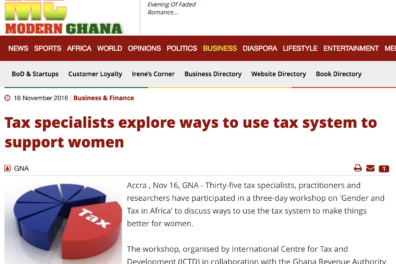
Ghana News Agency: Tax Specialists Explore Ways to use Tax System to Support Women
The Ghana News Agency covered the ICTD’s workshop on Gender and Tax in Africa, which was held in Accra in November.
Read the piece: Tax Specialists Explore Ways to use Tax System to Benefit Women
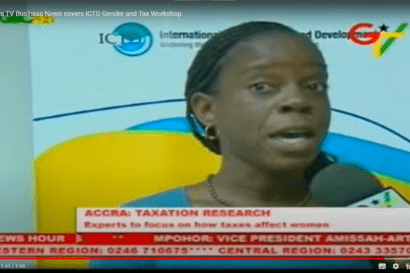
Ghana TV: Gender and Tax in Africa
GTV covered the ICTD’s workshop on Gender and Tax in Africa, which was held in Accra in November.
Watch the video here.
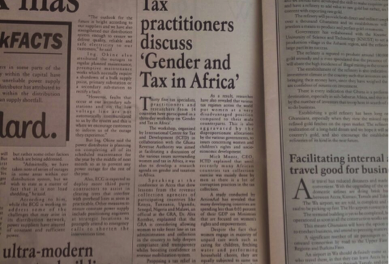
Business and Financial Times: Tax Practitioners Discuss Gender and Tax in Africa
The Business and Financial Times covered the ICTD’s workshop on Gender and Tax in Africa, which was held in Accra in November.
Read the full piece: Tax Practitioners Discuss Gender and Tax in Africa
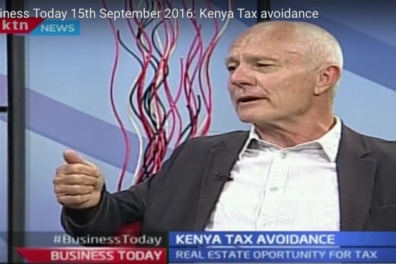
CEO Mick Moore interviewed on KTN’s Business Today
The ICTD’s CEO Mick Moore was interviwed on KTN’s Business Today show. He discussed the inequity of tax systems in Africa, the scandal of tax exemptions given by governments to large companies, the need for more effective property taxation (especially in large cities), and the necessity for regional cooperation on international tax issues.
Watch the full interview HERE.

The Independent- Uganda: Rich Who Dodge Taxes
ICTD Working Paper exposes rich professionals, government officials not paying income tax. URA now plans to tax better.
See the full piece here.
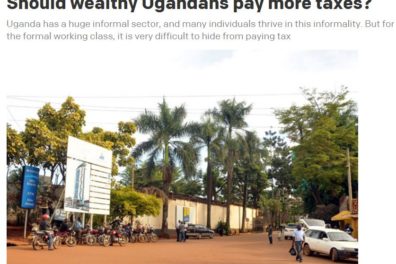
Daily Monitor: Should Wealthy Ugandans Pay More Taxes?
Some wealthy individuals in private and public sector either do not pay taxes or grossly under-declare their income. But if all these individuals remitted their income tax, the country’s revenue would be boosted.
Read the full piece here.
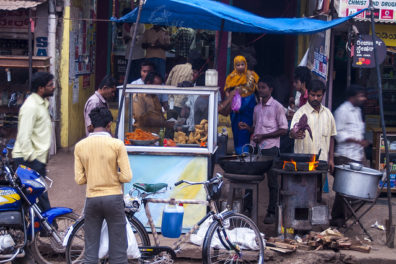
Taxing India’s Smallest Businesses – BBC Interview with Prof. Mick Moore
Roadside eatery in India. Garrett Ziegler/Flickr, CC BY-NC
ICTD CEO Prof. Mick Moore was recently interviewed by BBC World Service, about india’s plan to raise more revenues by going after the smallest businesses – especially samosa vendors.
According to Prof. Moore, “Though these small businesses can’t be ignored entirely, most governments rarely succeed when they go after the informal sector.”
“Instead of going after these very small businesses, the government should concentrate their efforts on administering tax systems that they already have in place in order to plug their loopholes. That will go a long way in ensuring people pay their taxes in the long run”. Said Prof. Moore.
The full interview which was aired on Friday 15 April 2016 can be found here.

Why African countries aren’t taxing their rich – Radio Interview
Our Research Officer Rhiannon McCluskey had a live radio interview on 19 April 2016, which airs on 702 and CapeTalk, commonly known as “The Money Show with Bruce Whitfield. This show is hosted each weeknight on two radio stations in Johannesburg and Cape Town (South Africa) by Bruce Whitfield, and focuses on business/economic news on the continent.
You can listen to the full interview here.
The interview was based on Rhiannon’s highly acclaimed and timely blog piece that was published on The Conversation website titled, “Why African countries are not taxing their rich. Why they should.”
According to Rhiannon, “The number of dollar millionaires in Africa rose at twice the pace of the rest of the world in the past 15 years. However, it is challenging for African governments to tax these wealthy people.” Read The Conversation article here.
Rhiannon’s article drew from a recent ICTD study titled, “Boosting Revenue Collection through Taxing High Net Worth Individuals: The Case of Uganda.” You can download the Working Paper here.

Improved knowledge on tax issues builds interest, increases compliance
Would you like an official value added tax receipt with that 40inch TV? No problem, that will only cost you an extra $42.
We watched a woman in downtown Nairobi in this very situation. She left with the TV, but without the receipt. Would you choose differently?
But do you know how much money the government loses each time you buy goods from vendors who don’t issue you with VAT/ETR receipts?
Do you understand that by doing this you are actually helping these businessmen evade taxes, and deny the government much
seded revenue to provide free primary education; fund hospitals; build roads etc?

RRA urged to embrace best international taxation practices
Rwanda has been urged to embrace best international practices on taxation and transfer pricing to boost cross-border trade and enhance the investment environment.
Dr. Thomas Balco, a tax expert from the International Centre for Taxation and Development (ICTD), said adopting global best practices in tax administration helps promote tax rights, as well as eliminate harmful tax competition that often affects competitiveness of companies.
“Apart from referring to rules that regulate tax liabilities, and the interaction of tax systems on cross-border trade, it is equally critical for Rwanda to strengthen its tax policies and align them with international tax systems,” Balco pointed out.
The ICTD expert and others from the Central Asia Tax Research Centre are conducting a five-day training for 100 tax inspectors, auditors and legal experts from across the country.

IDS: Taxes Help Spur Development
Low-income countries are being called on to generate their own financial resources for development. One of the ways they can do that is through taxes. It’s being discussed at the Third International Conference on Financing for Development in Addis Ababa (July 13-16).
Britain’s Institute of Development Studies has issued a policy brief on Building Tax Capacity in Developing Countries. It says that “governments will be urged to tax more effectively” and donors will be called upon to help build the capacity to do so.
Professor Mick Moore, CEO of the International Center for Tax and Development and one of the authors of the brief, said, “I think there’s now a very widespread understanding that a lot of low income countries could probably raise more of their own money themselves. And many of them understand this. You know, we’ve had an era of what I call ‘big aid’ for quite a long time now. And I think it’s clear to most people in the world that that era of ‘big aid’ is going to draw to an end.”

Tax them and they will grow
SOMALIA is not only one of the world’s poorest and least developed countries, it is also one of the most dangerous for tax collectors. By one reckoning a fifth of tax collectors in the capital, Mogadishu, were killed in 2012-14. Armed guards now accompany the remainder on their rounds. That may be an extreme case, but most poor countries struggle to raise much revenue, and therefore to pay for basic infrastructure and services.
Such difficulties will be one of the main topics of discussion at a United Nations conference in mid-July in Addis Ababa, the capital of Ethiopia, which will debate ways to finance developing countries’ most urgent needs. It is a precursor to two more big powwows this year that hope to set the agenda for development for the next 15 years. At the first, in New York in September, the UN plans to adopt global targets for development, called the “sustainable development goals”. At the second, in Paris in December, it hopes to agree a global scheme to combat climate change. Christine Lagarde, the head of the IMF, calls the three meetings a “once-in-a-generation opportunity for global development”.